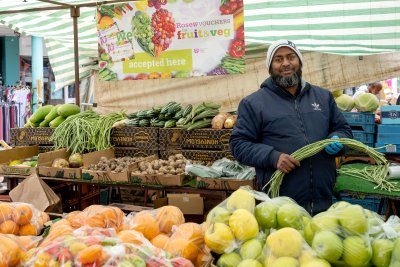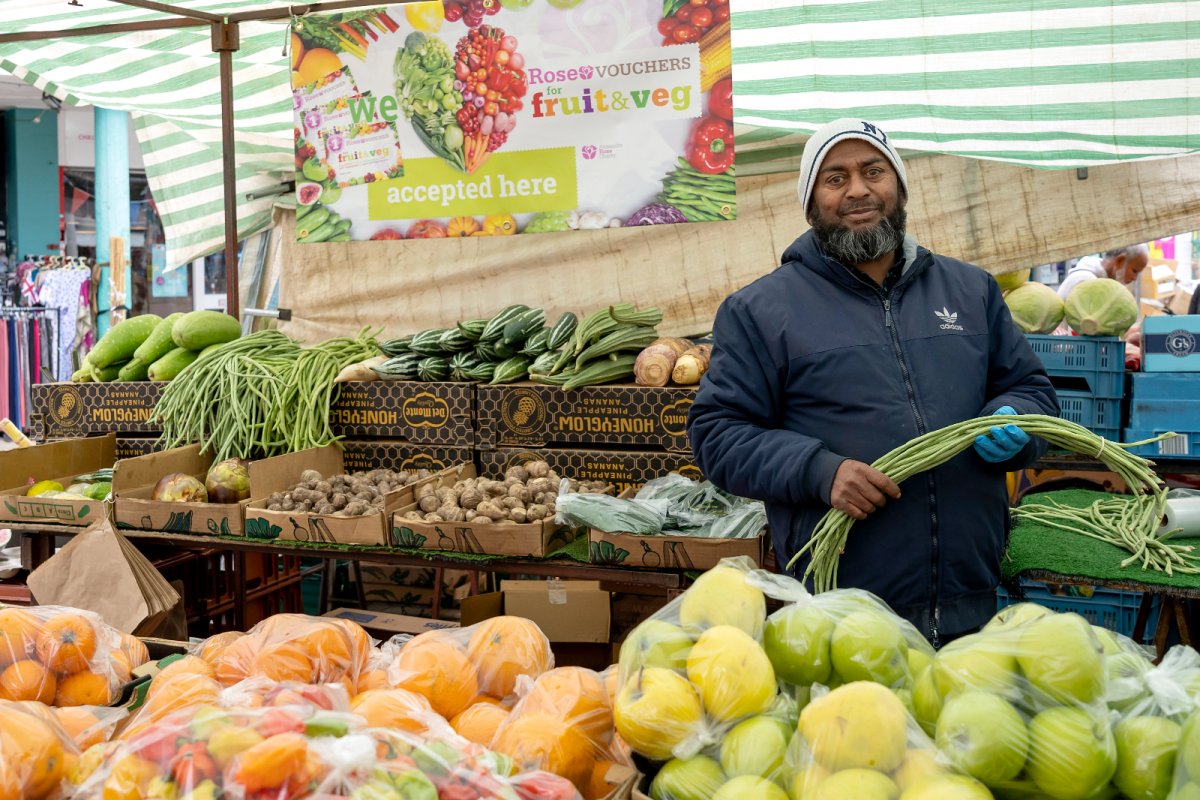 Market Trader at Chrisp St Market. Copyright: Alexandra Rose Charity
Market Trader at Chrisp St Market. Copyright: Alexandra Rose Charity
Squaring the circle on healthy, affordable AND sustainable food for everyone
Jonathan Pauling, Chief Executive of Alexandra Rose Charity, sets out why we must find ways to financially incentivise the transformation of the food economy, and his hopes for the Bridging the Gap programme.
I was walking across an overpass near K Road in Auckland, in my home country of New Zealand, when I spotted something beautiful. People working together on a small plot of land growing healthy and sustainable food for their local community. This chance encounter set me on a course for a career spanning the last 25 years, looking for a way to draw competing aspects of the food system together to create ways of making and selling food that would have positive benefits for people and planet. I wanted to see how the beauty I saw in this local solution, could be scaled to the wider food economy.
In 2002 I brought this bright-eyed, youthful enthusiasm to Britain. Landing in London, I soon found myself working in a vibrant community of food activists in East London who had coalesced around the Newham Food Access Partnership. The partnership’s aim was to improve access to healthy food for those living in the Borough’s identified ‘food deserts’ through local food co-ops selling fresh fruit and veg. Excited by the potential of linking these projects with sustainable supply chains, I went to work meeting with local farmers, land owners, community box schemes and farmers’ markets. Unfortunately, no matter how hard I tried, I couldn’t overcome the financial, logistical, and cultural barriers to making these supply chains work.
Then in 2012, another chance encounter with the founder of Wholesome Wave – an American not-for-profit financial incentives programme for healthy and sustainable food led me to my current role at Alexandra Rose Charity. What impressed me most about their model was the circular benefits that were spread across the food system. Wholesome Wave distributes vouchers to low-income families, who redeem them for fresh fruit and veg from local farmers’ markets, with the money ending up back in the pockets of local farmers.
We set about replicating the initiative in London. Through speaking with families, we realised that farmers’ markets in the British context weren’t going to be suitable retailers; these markets weren’t close enough to where the target families live; the families were concerned they wouldn’t be able to afford enough food even with vouchers and that the food wasn’t suited to their cultural tastes. They also told us they didn’t feel like they would be welcome in the farmers’ market environment or would ‘fit in‘ – a reflection of how ‘organic’ food has, at face value, become a preserve of the wealthier middle class. However, families suggested there was a ‘local supply chain’ that they did access and feel comfortable with – local, traditional London street markets. They told us that these are places of incredible value where you can get a lot for your money and where they can access culturally appropriate food in a warm and welcoming environment.
We subsequently set up our first pilot of the Rose Vouchers for Fruit & Veg Project in Hackney, East London, partnering with retailers at Ridley Road Street Market and Growing Communities Farmers’ Markets – both situated at different ends of the A10 that runs through the middle of the borough. 99% of vouchers in the pilot were redeemed at Ridley Road Market, as we had suspected.
Fast forward eight years – we now work in eight locations across the UK, supporting over 2,800 families weekly with vouchers redeemed at over 50 local market traders, six independent green grocers and one mobile fruit and veg van. Since 2014 over £1.5million worth of vouchers have been spent – adding to the economic vibrancy of local healthy food economies.
The barriers to squaring the circle of food access and sustainably grown food remain huge. If I had a pound for each time someone has asked me how we could get local agroecological produce into the project, I’d have enough to fund all our voucher costs for the year ahead! But it’s a passion that has never left me. It’s why I’m excited to be involved in the Bridging the Gap project alongside Sustain, our old friends at Growing Communities and hopefully many new ones.
The Rose Vouchers for Fruit & Veg Project has shown how financial incentives can be utilised to help people access a healthy diet and avoid food poverty, and I’m excited to see how other financial mechanisms could be used to ensure that everyone can have access to climate and nature-friendly food. We’ve learnt that using existing trader routes, like street markets, has great potential and benefits. For example, in a recent evaluation we found that for every £1 Rose Voucher that is spent in a street market a total of £3.11 of economic value is created in the local community. This means that financial incentives can tackle health inequalities but also reduce overall economic poverty while maintaining the economic vibrancy and sustainability of local, independent food economies.
The Rose Vouchers for Fruit & Veg Project already exemplifies and intervention that shifts the dominant model from food aid to food trade. At the same time, we know that working with places like street markets, doesn’t come without challenges. These are small, owner operated businesses trying to make a living in communities who are incredibly price sensitive and where profit margins are very tight. There is a long and rich history of traditional markets in the UK but this also brings dynamics of ingrained supply chains and ways of working. We know that we going to face some big challenges and assumptions, about who can access and who wants agroecological food, and how they want to receive it? How do we ensure that the produce on offer meets the diverse diets of the communities that markets serve while introducing others with very low levels of fruit & veg consumption to the seasonal gluts and scarcity of the UK’s production “hunger gap” in late winter/early spring? And possibly the most contentious, how do we define Nature and Climate Friendly Food or agroecological for supply chains? Some of our market traders do have established links with local farmers. I remember touring the indoor market in Barnsley in South Yorkshire which has been trading since 1249! I met one trader who had been at the gate of a local farmer that morning picking up produce so fresh, it still had morning dew on the leaves of the cabbages! Although it wasn’t organic, it was as hyper local and fresh as you could possibly get, but is this enough?
Even though these challenges loom, Bridging the Gap is it’s a huge opportunity to test approaches to prove there is value in linking the policy areas of health, equity and sustainability in regard to the impact of our food system. I’m keen to prove to my younger self that it wasn’t just the idealism of youth that led me into this career and that we really can create a food system that’s good for people and the planet.
Of course, I’m partial to using financial mechanisms like vouchers, and can’t wait to see what else we can do using this approach. Together with all the partners at Bridging the Gap, we are keen to hear what other ideas we might co-develop together. Please do get in touch with your own experiences working in this field. We’d love to hear from you.
You can read other blogs in the series, including an introduction to Bridging the Gap from Sarah Williams, Programmes Director at Sustain and a recent blog from Julie Brown, Director at Growing Communities who delves into the issue of price of food.
Join the mailing list or follow us on Twitter to hear about opportunities to get involved.
Bridging the Gap: Bridging the Gap to climate and nature friendly food for all.
Sustain
The Green House
244-254 Cambridge Heath Road
London E2 9DA
020 3559 6777
sustain@sustainweb.org
Sustain advocates food and agriculture policies and practices that enhance the health and welfare of people and animals, improve the working and living environment, promote equity and enrich society and culture.
© Sustain 2024
Registered charity (no. 1018643)
Data privacy & cookies








